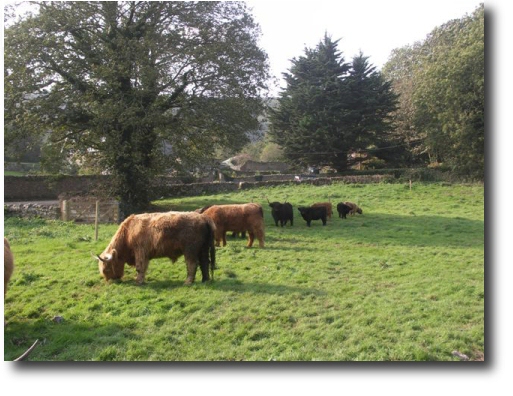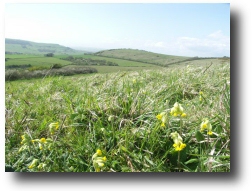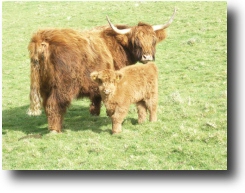Nevertheless, we can make improvements in how we manage ourselves to become more eco-friendly, principally by better planning of our energy use. But how will the warming affect our farming and conservation? It poses serious questions on every front and at present, like everybody else, we are largely short of answers. How will the Highland cattle fare in a consistently warmer but still wet climate? How will our grasses cope with the change? How will our wild flora adjust? What will be the impact upon our hedges? Will our birds and invertebrates adapt, or migrate elsewhere? The effect of global warming in our woodlands will become apparent in about 20 years time. Trees cannot tolerate too much. Stress can arise from too much heat, not enough chill, draught, disease, and pests. Some species will adapt better than others. New diseases and pests are already spreading from the southern climes. Healthy ash requires periods of chill, which are rapidly reducing. Native sessile and pendunculate oak will find the increasing warmth hard to bear. Needle blight will be a problem with some pines. With our existing trees we will have to hope for the best but in any re-planting it will be sensible to source seeds from the warmer regions where the trees have become genetically adapted. We should plant a greater variety of trees so that failure of one individual species will not have too much of a dramatic impact on the woodland as a whole. Global Hunger? We could produce more beef by changing the breed and intensive management but this will be at the expense of quality and our land care. What worries me most as a conservationist, however, is the threat of Government reversing its environmental policies and reverting to pure production based grants. In global terms, such a measure would be insignificant and have a nil overall impact upon either output or prices. It would make virtually no difference to the content or price of your weekly shopping basket. In environmental terms, however, it could be disastrous for the UK. Eco valuable field margins and beetle banks would be ploughed up, hedges ripped out, woodland taken into arable production, and fertilizers and pesticides applied ad nauseum. I always consider the quality of wildlife, flora or fauna, to be a measure of the health of the planet. It is a stabilizing factor for the future. Damaging our wildlife, eco-systems or food chains could store up a host of insurmountable problems for the future. On a more cheerful note, we have experienced two major successes so far this year. The RSPB, in conjunction with BBC Countryfile Magazine, Butterfly Conservation and Plant Life, has instituted a Nature of Farming Award. The competition is divided into seven different regions. Each regional winner will go onto a semi final from which the four finalists will be selected. The winner will be chosen by votes from RSPB members and Countryfile readers. Wight Conservation has won the Southern Region from 22 entries, and has high hopes of being selected as a finalist. Watch this space, as your vote will count! At the Highland Cattle Society’s annual Bull Show and Sale in Oban in February we showed our home-bred two year old bull, Ruairidh 2nd of Mottistone. He won the overall championship. This is a remarkable achievement for our farm staff who help us, especially as it is unprecedented for an English Fold to have won the cup twice. With the flora emerging, trees coming into leaf, and our cows calving, I promise you that the next diary entry will not be so long delayed!
Previous Entries: September 2005; October 2005; November 2005; December 2005; January 2006; February 2006; March 2006; April 2006; May 2006; June/July 2006; August/September 2006; End of Year 2006 | ||||||||


